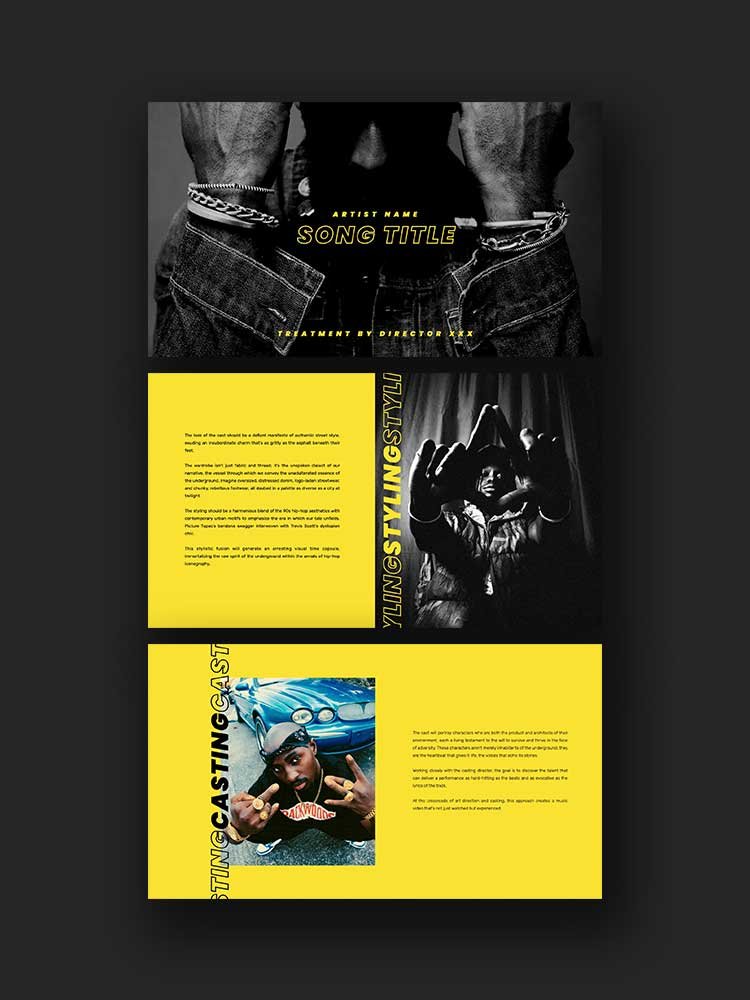How to Plan a Music Video?
The adrenaline rush of seeing the magic of music translates into moving images is a thrill every artist should experience. It can create a new layer of storytelling that can build a deeper connection with your fans and significantly boost your music career.
In the fast-paced world of digital content, the importance of making music videos cannot be understated. Whether you're on a shoestring budget or have access to big-budget resources, this guide will show you how to plan a music video like a pro.
1. Conceptualization: The Power of Ideas
Before you dive into your first music video, let's start at the beginning – the concept. Your video concept is the backbone of your entire project.
It’s what differentiates your music video from other music videos and gives it a unique flavor. The lyrics of your music track can inspire this concept, the mood it evokes, or even a vision unique to you or your band members.
Try to think of a narrative that aligns with your song. Don’t hesitate to get creative and think outside the box. Remember Lady Gaga's groundbreaking music videos? Or the soulful storytelling in Selena Gomez's visuals?
They provide a visual narrative accompanying the audio track, elevating the overall music experience.
2. Budgeting: Making the Most of Your Resources
The next step is to establish a budget for your music video. While the amount can vary greatly depending on your circumstances, remember that even low-budget music videos can look professional and captivating if planned correctly.
Just because you might be making a music video on a small budget doesn't mean you have to compromise on quality.
Instead of saving more money though, think about how you can use your resources most effectively. This might involve renting equipment instead of buying, filming in a free or cheap location, or enlisting the help of friends and fans as crew members or extras.
3. Pre-production: Building the Blueprint
Pre-production involves nailing down the details of your whole video shoot, including finalizing your concept, scouting locations, hiring your crew, creating a shooting schedule, and preparing any props or costumes.
This stage of the production process is crucial in ensuring that the music video shoot goes smoothly.
A critical aspect of pre-production is ensuring all crew members are on the same page. Make sure your director, cinematographer, camera person, lighting person (or lighting designer), and sound man, among others, understand the concept, schedule, and individual responsibilities.
4. Production: Rolling the Cameras
You've reached the stage where all the meticulous planning starts to come alive – the actual music video shoot. This is when you record all the footage you'll need for the final video.
Band members or individual artists perform for the camera, acting or playing along to the song plays. Make sure to capture your videos with full-length shots, close-ups, and multiple camera angles for a dynamic final product. Always aim to capture great footage to provide the video editor with plenty of options during editing.
When filming, pay close attention to your visual aesthetic. For instance, if you’re filming a pop music video, you might choose a well-lit indoor location with vibrant colors.
If you’re going for a moody rock video, a darker, grittier location might be more suitable. Using a green screen can also open up endless possibilities, regardless of physical location.
5. Post-production: Crafting the Final Cut
Once the music video shoot is wrapped, it's time to piece together the video footage to create your music video. This is where the video editing software comes into play. Choosing the right editing software can make or break your music and video content creation experience.
Whether it's Adobe Premiere, Final Cut Pro, or a different platform, ensure your software fits your technical skill level, budget, and needs. Use your video editing software to cut and arrange clips, add effects and transitions, and synthesize the video content with the audio track.
The post-production process isn’t just about cutting and pasting clips, though. This is where you can add sound effects, visual effects, color grading, and other finishing touches that enhance the narrative and aesthetic of your video.
Remember, the post-production process is where your raw footage becomes a polished, finished video.
6. Review and Release: Sharing Your Creation with the World
After you've gone through the editing process, it's time to review your final video. Viewing the entire video repeatedly is crucial, ensuring every detail aligns with your original concept and music track.
Once satisfied with your final cut, it’s time to share your music video with the world! A good marketing strategy ensures your video reaches its intended audience. Promote the release on your social media, website, and any other platforms where you connect with your fans.
Conclusion: Creating a Visual Symphony
Despite the challenges, making a music video can be one of the most rewarding experiences for any musician. It’s a collaborative process that allows you to express the emotion and narrative encapsulated in your music visually.
Whether planning a low-budget music video or having resources for a more extravagant production, remember that your creativity is the most vital ingredient in the mix. Never underestimate the power of a well-crafted video to leave a lasting impact and push your music career to new heights.
Remember, there are no hard and fast rules in making music videos. Let your imagination run wild, experiment with different camera angles and ideas, and most importantly – have fun with it. After all, you’re creating a piece of art that represents your music, and that’s a fascinating undertaking!
Frequently Asked Questions About Planning a Music Video
How do I come up with a concept for my music video?
Your music track should ideally inspire the concept for your music video. Listen to your song and note any images, stories, or feelings it evokes.
Research other music videos for inspiration, but always strive to create something unique that represents your music.
Can I make a music video with a low budget?
Absolutely! While having a big budget can give you access to more resources, creating a compelling music video on a low budget is possible.
Use your creativity to work within your means, and remember that a great concept and execution can make a video memorable, regardless of the budget.
Who do I need on my production team?
For a basic music video, you will need a video director, a camera person, and possibly a lighting person.
Depending on your concept and budget, you might also need extras, makeup artists, costume designers, and a production assistant.
What kind of equipment do I need to shoot a music video?
At a minimum, you will need a video camera and possibly an external microphone for better audio quality.
Depending on your shoot, you may also need lighting equipment, props, costumes, and extra storage memory for your footage.
What is the pre-production process for a music video?
Pre-production is the stage where you finalize your video concept, scout and secure your locations, hire your crew, and create a shooting schedule.
It's a crucial part of the music video creation process, setting up the foundation for your shoot.
How do I edit my music video?
You will need video editing software for this step. During editing, you will arrange your video footage, synchronize it with the audio track, and add any necessary visual effects, transitions, or sound effects.
Can I shoot my music video in one location?
Yes, shooting in one location is a common technique used to save money, especially for low-budget videos. Ensure the location fits your video concept and has enough visual interest to engage your video.
How do I make my low-budget music video look professional?
The keys to a professional-looking video are good lighting, stable footage, and good sound quality. Investing in a good video camera and an external microphone can go a long way.
Also, ensure your video is well edited – good editing can make a huge difference in the final result.
How long should it take to make a music video?
The time it takes to make a music video can vary widely. It depends on your concept, the number of locations, the complexity of your shots, and how much time you have allocated for editing and other post-production processes.
A simple video might take only a few days, while a more complex one could take weeks or months.
How do I promote my music video once it's finished?
Use every platform available - social media, YouTube, your website, and even email newsletters. Reach out to music bloggers, use SEO strategies for YouTube, and consider paid advertising if your budget allows.
Also, don't forget to engage with your fans and viewers - respond to comments and encourage them to share your video.






































